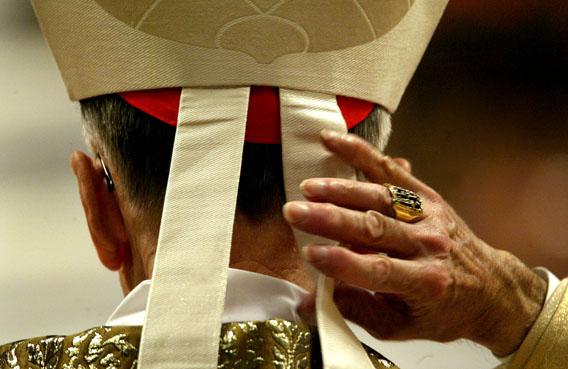One-hundred-fifteen Roman Catholic cardinals locked themselves up in the Vatican today to select the church’s next pope. In pictures of the cardinals, they were shown wearing a variety of unusual hats. How do cardinals choose their hats?
To suit the occasion, to represent their homeland, or, sometimes, to make a personal statement. Cardinals primarily wear one of three different types. The most basic hat is a skullcap called the zucchetto (pl. zucchetti), which is a simple round hat that looks like a beanie or yarmulke. Next is the collapsible biretta, a taller, square-ridged cap with three peaks on top. There are certain times when it’s customary to put on the biretta, such as when entering and leaving church for Mass, but it’s often just personal preference. Cardinals wear both of these hats in red, which symbolizes how each cardinal should be willing to spill his blood for the church. (The zucchetto is actually worn beneath the biretta.) Some cardinals also wear regional variations on the hat, such as the Spanish style, which features four peaks instead of three. On special occasions, such as when preparing to elect the next leader of their church, they may also wear a mitre, which is a tall and usually white pointed hat. The mitre is the same style of cap commonly worn by the pope, and it comes in three different styles with varying degrees of ornamentation, according to the occasion.
Cardinals are also strongly associated with the wide-brimmed galero (pl. galeri), which resembles a cowboy hat but with two long sets of tassels. The galero was once the signature hat of the cardinal. The lowering of the galero was “the highlight of the investiture ceremony” that inducted new cardinals, according to the New York Times. But the Catholic Church, like so many people, found the 1960s to be a time of radical change in fashions. In 1967, Pope Paul VI began to crown cardinals by bestowing birettas instead of galeri, in a move toward humbler headwear, and in 1969 he abolished those hats altogether. Despite the papal decree, there are some who would like to keep the galero alive, however. American cardinal Raymond Burke was spotted apparently trying to bring back the vintage hat, and cardinals may still feature it in their coats of arms.
Pope Paul VI isn’t the only one to leave his stamp on clerical fashion. Whereas other clergymen follow fairly constricting guidelines when it comes to their ceremonial garb—cardinals wear red, bishops wear purple, and priests wear black—popes are free to choose different colors and start their own trends. Few have taken advantage of this freedom like the recently retired Pope Benedict XVI, who was known for wearing a wide variety of headwear. For example, Benedict was known to sport a saturno, a wide-brimmed hat similar to the galero. He was also seen venturing out in a camauro, which looks almost exactly like a Santa hat. Even when it came to the traditional mitre, Benedict generally chose hats taller than those worn by his predecessor, who chose to keep things simple. For his sartorial efforts, the Chicago Tribune called Benedict “the best dressed pontiff ever!”
Popes also used to wear the papal tiara, or the triregnum. However, this hat was similarly outmoded by Pope Paul VI, who in November 1964 announced that he was donating his tiara to the poor. His successor, Pope John Paul I, declined to wear the tiara, and after the end of his 33-day reign, Pope John Paul II followed his predecessor’s lead. The tiara was “considered, wrongly, to be a symbol of the temporal power of the Popes,” he explained.
Men of the cloth can also change Vatican fashions from the ground up. Ahead of the changes in Vatican headwear that would come later in the ’60s, some prelates petitioned to be able to wear the zucchetto instead of the stiffer biretta. After the cappa magna, a 30-foot train of silk that was carried behind the cardinal, was abolished in 1952, a group of Roman cardinals petitioned for its return. Pope John XXIII allowed it, saying, “A bit of vanity is good for the Church.”
Got a question about today’s news? Ask the Explainer.
